As an amateur scholar and die-hard enthusiast of everything to do with Alice in Wonderland, I have launched a Podcast that takes on Alice’s everlasting influence on pop culture. As an author that draws on Lewis Carroll’s iconic masterpiece for my Looking Glass Wars universe, I’m well acquainted with the process of dipping into Wonderland for inspiration. The journey has brought me into contact with a fantastic community of artists and creators from all walks of life—and this podcast will be the platform where we come together to answer the fascinating question: “What is it about Alice?”
For this week’s conversation it is my pleasure to have Andy Malcolm and Wendy Rowland join me. Read on to explore a sampling of our conversation and check out the series on your favorite podcasting platform to listen to the full interview.
If you like my interview with Andy and Wendy, please consider donating to their GoFundMe campaign to finish There’s Something About Alice so they can share it with the world.
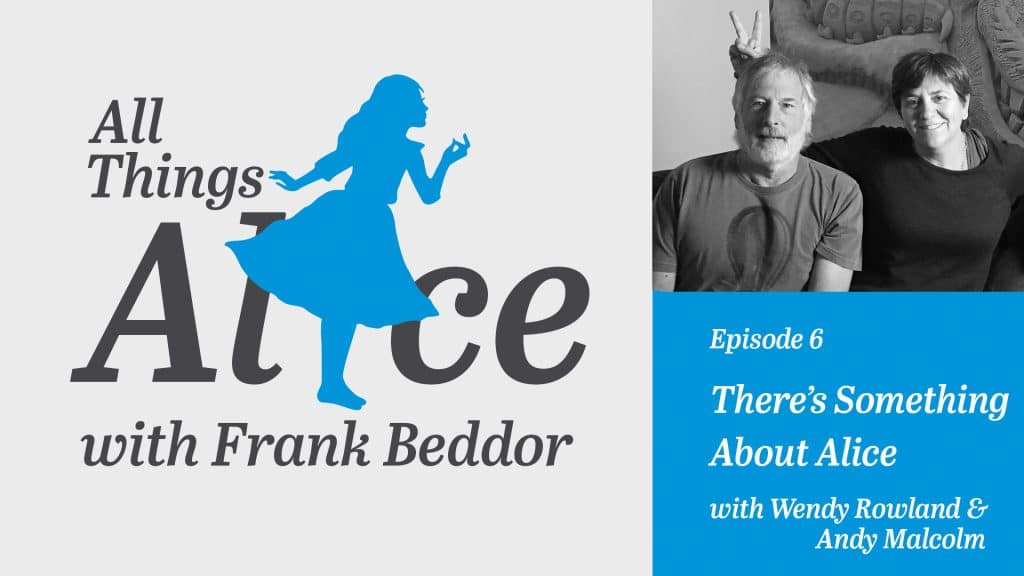
FB
Hey guys, I'm really excited to be chatting on this podcast with you today because this is the first interview with someone I have not previously worked with and you have a project independent of anything that I've worked on before, which is very exciting. Of course, the reason we're here is to talk about your fantastic documentary, There’s Something About Alice. So, my first question is, it seems like you might have been inspired to use the title based on the movie that I made: There's Something About Mary. Is that accurate? Were you riffing off of my title? Or did you come up with that on your own?
AM
We were riffing off your title. The film was so successful.
FB
That was very smart. I love the title. After the movie, somebody wrote an article that was “There’s Something About Frank,” so it's appropriate. Let’s talk about your documentary because I'm always interested in meeting and talking to people that have a love for Alice. The premise behind your documentary is Alice and pop culture. Can you give us a sense of the project's genesis and the why now? I know you've been working on it for a long time. But what got you excited about it?
AM
We started in 2012, when we heard about an event that was happening in Oxford, England to celebrate the 150th anniversary of the telling of the tale. I recruited Wendy and Robin, our cinematographer, and said, “Let's go to Oxford and film the event and see what comes of it.”
FB
What was happening at that event?
AM
It was a three or four-day event. It started off with a boat trip on the Thames and the first lunch was at Godstow, which was where Lewis Carroll told the story to Alice. In the afternoon, we went for a row in the same kind of boat that Lewis Carroll took Alice and her sisters rowing in and then there were panel discussions.
WR
There were also art exhibits and picnics, and they had a small two-person experimental play. Then on the river, they had a couple of kids dressed up like Alice and her sisters, and two young men dressed up as Dodge and a friend. It was four full days. We just arrived with our camera and started filming and at that point, we didn't really know what we were going to do. We just thought, “let's document that.” That was when this idea of Alice in popular culture emerged.
Andy has been, for years, a part of the Lewis Carroll Society. I was new to it all. I'd read Alice, but that was about it. We didn’t start out thinking the documentary was going to be about Alice in popular culture. I think that after we started doing some interviews, we started to think about the bigger picture and how the story of Alice and Alice, the character, has been reinvented with every generation. That's the path we took over the 10 years that it took us to make the film.
AM
We hadn't even stolen your title by then because we were mostly dealing with Lewis Carroll. Then as we progressed, it became more about Alice.
FB
I love that choice because most films I've seen are really about Lewis Carroll, and his inspiration and of course, all these locations that you visited, but that's territory that's been mined a few times in documentaries. So, the notion of exploring Alice in pop culture and why it's lasted so long, and what a cultural phenomenon it is, gives your documentary a unique angle. As you said, Wendy, it gets redefined every era, every decade, depending on what's going on in that era. In the 1960s, there were all the psychedelic references because of the mushrooms and Jefferson Airplane's “White Rabbit”. Then, when The Matrix came out, it was about the internet and falling down into a parallel world. It keeps getting redefined. That's what you covered so well. On that note, what was the process of picking people to interview? What were you looking for?
AM
We were paying attention to Lewis Carroll meetings. Our next event was American McGee, speaking to the Lewis Carroll group in Los Angeles. We made a special trip down for that and we recorded the talk he gave in front of the society. We also got a private interview with him in the library after that. Then, in 2015, New York was celebrating the 150th anniversary of the publication of the book. We went down for that and there was an auction selling an 1865 edition of Alice in Wonderland, for which the opening bid was $2 million. That was a special event.
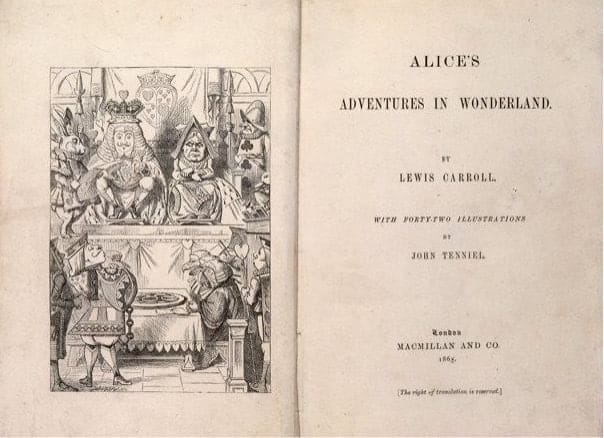
FB
Were you able, in your film, and over these 10 years to answer the question, what it is about Alice that would motivate somebody to spend $2 million on a book? Because at the end of the day, isn't that a question you were asking yourself? It's a question I would ask myself.
WR
There is something but I'm not sure there's a specific answer. I think that’s the interesting thing about the film, is that everybody in the film has their own answer to that. Some people think it's because there's something about that character that can live on in your imagination and can go so many places because she goes down this rabbit hole, which is a term that's used over and over and over again. There's such a breadth of so many characters that different people can relate to. Also, Alice is timeless, in the way she looks, and in the way she dresses. She's not pinpointed in the Victorian age. She could exist in any decade, which I think is interesting. One of the things I love about the film and the people we interviewed, is there are so many different answers to why Alice lives on. Maybe you don't even need an answer. You just have to dive right into it, and everybody takes what they want out of the story.
FB
I think that's true. She has become a universal muse for creativity and imagination. Those words come up all the time. That's what American McGee said in the film. He said something like, “There's something about her imagination that appeals to everyone.” She became a muse for me and she's a muse for you. I'm curious Andy, about the Lewis Carroll Society. What is it? What is the purpose? There are numerous Lewis Carroll societies around the world, one in New York, one in Japan, and one in London. Do I have that right?
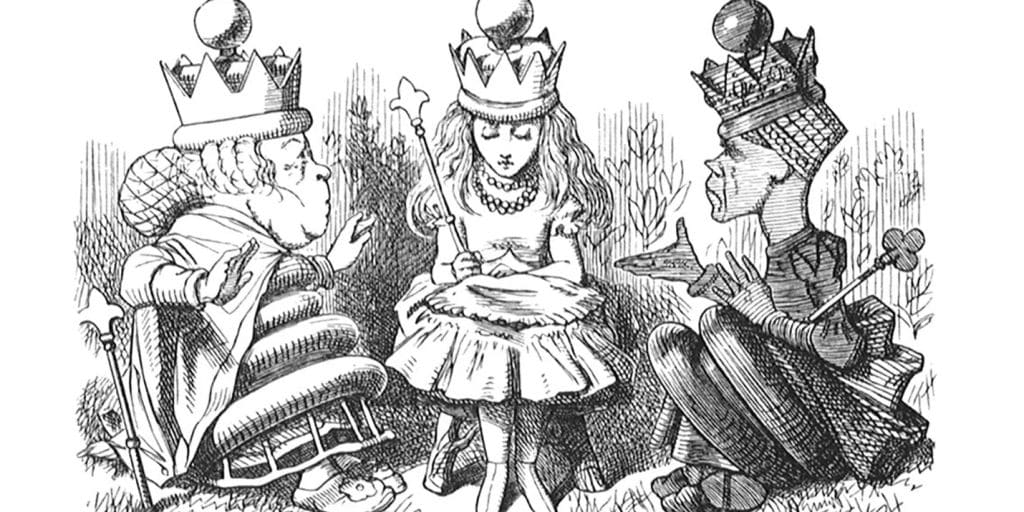
AM
Yes, and one in Brazil and one in Holland, and one in Canada. It’s people getting together and sharing stories and having talks and exchanging artifacts. Just all people who are really amongst Alice and really enjoy the story and want to share it with others. We have major people speaking at our events. Adam Gopnik has spoken at various meetings and a lot of the mucky mucks, the Martin Cohen’s, and the Edward Wakeling’s and all these kinds of
scholars.
FB
I even heard you landed that author, Frank Beddor. He’s impossible to get. I heard he was really hard to work with.
AM
But he talked about Alice's avatar and maybe you could explain that a little more to the audience because I found that was a fascinating part of your talk.
FB
I'll just let everybody know that I'm teasing. It's an inside joke. When I found There’s Something About Alice, I reached out to both Wendy and Andy about doing an interview. Then we had a preliminary phone call and they said, they had interviewed me for the documentary in 2015 when I was in New York, speaking at a Lewis Carroll Society event. I walked outside and they accosted me. They approached me and said that they were doing this documentary, and they asked me some questions. So, it turns out that we had previously met, which was a delightful little coincidence. But I was talking about Alice as an avatar in the same way I just mentioned that she’s a muse. Of course, I probably said it in a really elegant, very deep, meaningful way, but it still did not make it into the film. I will forever give you a hard time about that. Maybe we can find a place for it somewhere on my website, one day.
WR
We will for sure.
AM
And the 40 other people that didn't make it. It really didn’t have anything to do with the quality of the talk, or what people were saying, when you start editing the film together. We've probably used a quarter of the interviews that we actually recorded.
FB
Let's talk about that. It's a nice segue way, because of all the Alice’s out in pop culture, whether it's music, theme parks, television, or gardening - you find the Alice in Wonderland syndrome, which is a medical term. How did you go about choosing the clips that you wanted to include in the film and the folks you wanted to interview?
WR
It is the hardest part. You end up with hundreds of hours of footage and then you have to figure out how to bring it down to an hour. We had endless amounts, from Betty Boop to a Rexel commercial, to Jonathan Miller, to Jan Svankmajer. We wanted to include everything. It was a never-ending treasure trove of footage that we could dig up. Andy’s also a collector and has beautiful images and hundreds of books of illustrations, which is where his initial interest lies. First, we came up with the theme of Alice in popular culture, looking at every generation that gave us a through-line so we could go from early Alice to the current day. Then it was just trying to find things that were unique and interesting. We did look at Disney. There were certain things that you can't ignore. But it was also trying to draw in things that people wouldn't see every day. The response to the film does seem to be that most people were unaware of how widespread Alice is. How many musical versions, how many composers have used different parts of the story, like David Del Tredici. We were trying to create this really broad picture, but still have it have a point, because you can't just have stuff thrown all over the place.
FB
There was a very clear theme and through-line. I think people are going to love this documentary. There are gems in there. For instance, WC Fields as Humpty Dumpty in the 1933 Alice in Wonderland film. You hear his voice, and you go, “Wait a second, I know that. Who is that?” So, if you're an Alice fan at all, this a film you must watch. But I wanted to go back to why you chose an hour given you have so much footage. Is that a typical length of time in terms of selling this or putting it on a network?
WR
When we started the film, we decided that we wanted to make the film we wanted to make. We didn't go and pitch it to the CBC, or the BBC, or to any other networks. Because you often lose control. Often, they want you to make a film different from the one you wanted to make. For Andy being the producer, the Lewis Carroll fan, and the Alice collector, this was his labor of love, and it became our labor of love. We just wanted to make the film we wanted to make. We didn't want to be reined in. I've made stuff for television and a TV hour is actually more like 46 minutes because you have to have advertisements. Now that's kind of gone. There aren’t really many guidelines these days, because of the streamers. It was really just a coincidence that our film ended up being an hour. It just felt like the right length. It felt like it wasn't repetitive. For instance, American McGee, who's in the film, we really loved him, and we had so much content, but we had to take about half of his stuff out of the film because you're looking at the pacing, you're looking at where people's interest might kind of fly. You’ve got to keep it moving. So, when we finished, we were like, “This seems like the right length.” And it turned out, it was approximately an hour. We weren't constrained by any broadcaster's time.
FB
Let's talk about some of the people you interviewed because I found that very enjoyable. You brought up American McGee. He is a big Alice fan and has this game that he's been working on for years and years. I have gone to lunch with American McGee when he was in Los Angeles and a friend of mine was trying to produce his game as a movie when it was sold at Dimension. He must have a really interesting take because he's worked in the game space, but he also understands the rest of pop culture. What were some of the more memorable moments that you recall from interviewing him?
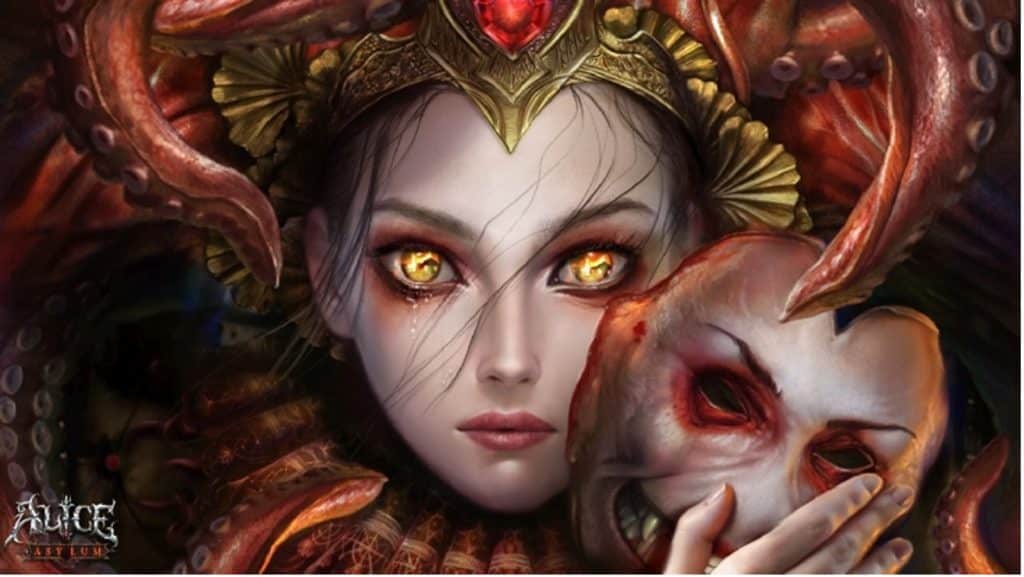
AM
It was funny because he said, right off the bat, “Well, the first thing I did was I murdered Alice's family.” It gave him a springboard so he could interpret the story in his way for a video game. But he said he always listened. Whenever he had a question, he would always go back and think about, “Well, what would Alice say about this?”
WR
While his game does seem like the opposite of what you would think for being based on a child’s storybook, he did return to the text a lot and he tried to stay true to it. It’s interesting because it is violent and dark but there's a piece he held onto that he wanted to remain faithful to the story.
FB
I was going to say that that's quite an understatement that it doesn't stick to the storybook version because she's in an insane asylum with a cat that assassinates most people. But in listening to the interview, that comes across, which was great, because he does contextualize the reason that people are interested in Alice. He also had the theory that Alice is in a lucid dream, which gave him a lot of freedom creatively to do something in pop culture that reflects what's going on now. I think people that watch your film will make that connection and enjoy it, one if they're a fan of the video game, but two, because he has a really interesting take that you captured.
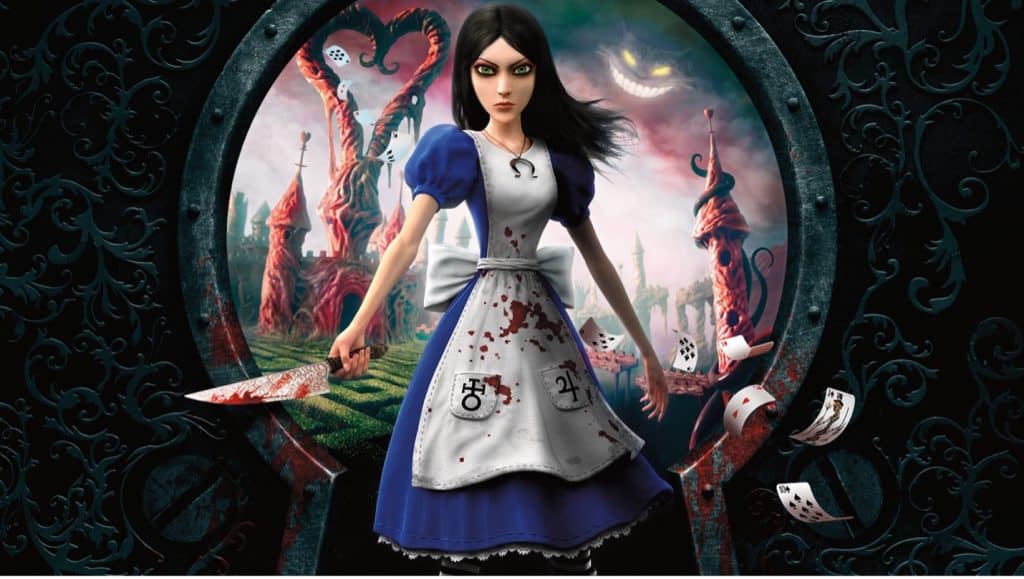
WR
He’s really, if you’re familiar with the video game, you sort of have an idea of what this person American McGee with this interesting name is going to be. Then you meet him and he's this really soft spoken, thoughtful, really articulate renaissance man. It wasn't at all what we expected. I hadn't done a ton of research. I’d read a little bit about him and gotten got my 16-year-old son to set the game up for us, who loved that we were encouraging him to play this totally violent game. But American McGee was just this lovely guy who you could have talked to for hours. You could tell he was really intellectual and wasn't just this mad video game inventor, so I think it was a really pleasant surprise for all of us.
FB
I had a lunch with him, and I would have used all the same adjectives. He didn't create that game to capitalize on the title. He used Alice to tell his own story and to thematically express something that was meaningful to him. Let's talk about Ralph Steadman. I was really delighted to see the interview and I was super surprised that you are in his studio. How did that happen? Tell us a little bit about Ralph and what it's like to interview somebody that is, how I see him, an eccentric genius. What was your experience?
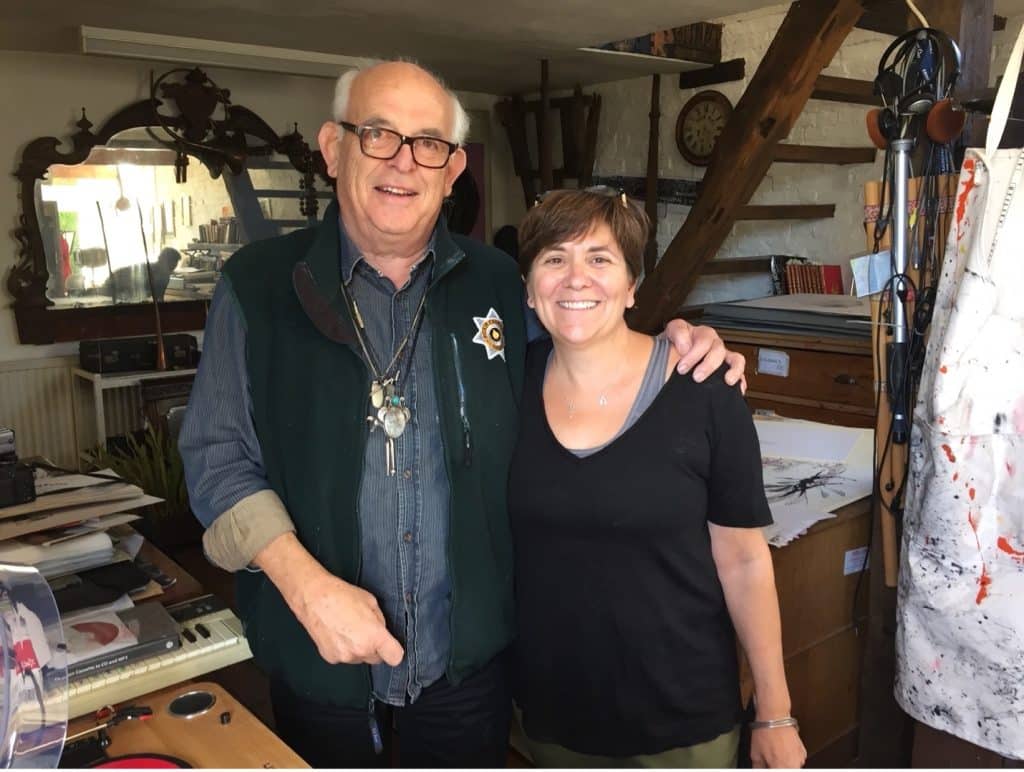
AM
He is indeed an eccentric genius. We were able to organize the interview through his daughter who looks after all his business. We were as surprised as everybody will be when they see the film that he consented to do the interview. But he was just so much fun. We spent the whole day interviewing him. Thank God Wendy is the amazing editor that she is because he didn't complete a sentence. He would go off on a tangent and be talking about somebody and he goes, “Yeah, Ringo Starr. Is Ringo Starr still alive?” We left more in the interview than what he talks about, specifically about Alice because it was his first big break into illustrating books.
FB
Can you elaborate on that? Because I think that's interesting. I think readers and listeners will know that he had worked on Hunter S. Thompson's albums and books, and he's worked in music and publishing, but Alice in Wonderland was his breakout.
AM
He illustrated the story in 1967 and he said it was his first big break into the illustrating business. His only regret was that he didn't write the story.
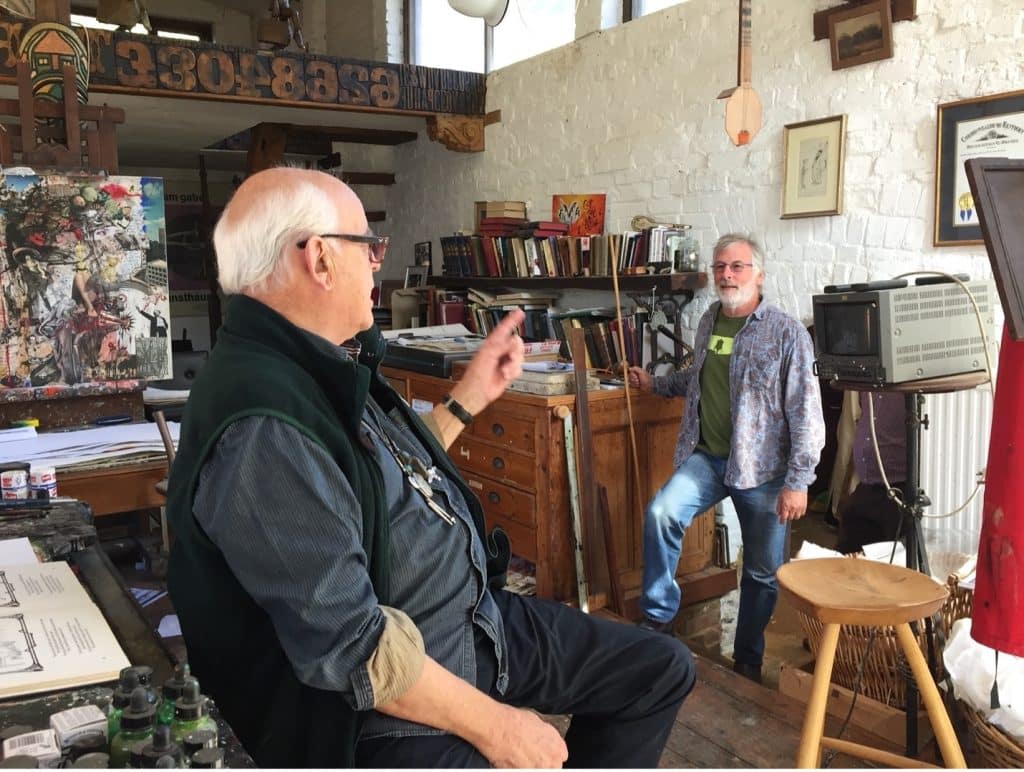
WR
I don't think he was that familiar with the story when he was approached to do the book. I found it to be quite a moving moment. We're doing the interview and he pulled out a lot of the original drawings from when he'd made the book. It was great to watch him rediscover it because he said he hadn't looked at it for years. He’d go, “Oh, I really liked how I did that. Oh, yeah, I was just starting to do lines in that way.” He’d go off on these tangents, but he'd always come back to his drawings. At one point in the interview, he has the book in front of him and he realizes that this is a book he had given to his parents and had done an inscription for them. I think he had forgotten. Then he reads what he'd written to his parents, and he said, “I send you this rare copy.” He laughed because he figured it wasn't going to do that well, so it was not really going to be rare. He said, “Far and away the best thing I've ever done.” You could tell he was quite moved remembering writing that for his mom and dad. I think he would have stayed and just kept talking to us all day long and his daughter finally, sort of said, “Okay.” She generally has to rein him in, when he's doing interviews. But then they invited us out for lunch, and we spent the day with his wife and him and his daughter eating at this lovely pub. It’s sort of amazing when you never know if you're going to be given one hour with somebody and it's just going to be this really straight-ahead interview or if you're going to have this completely wacky day, where you meet this lovely man who's an incredible artist.
FB
I really identify with him reading what he wrote to his parents because when you do something at that age, and you're publishing something for the first time, you always reach out to your parents and it's emotional when you look back. I love the fact that you were watching him rediscover it. He's my favorite of all the illustrators that did Alice, so I was really excited. But I'm even more excited after you said that story to hear the rest of the interview. There could be an hour special on Ralph Steadman.
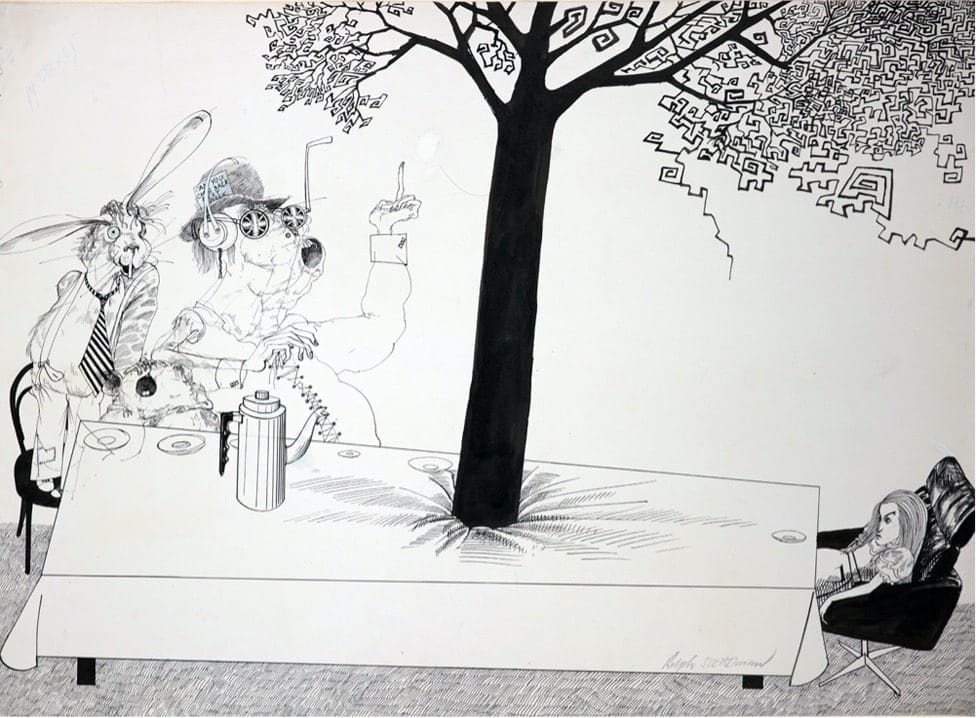
WR
Our hope is to make these interviews available because he said so many great things, but the problem is, you can only include so much. There’s maybe five minutes of him in the film when we have two hours of footage with Ralph.
FB
That's fantastic. And you had lunch and you got to see his studio and have a full experience with a very talented man.
WR
We all brought our books, and he signed them all with his ink splatter signature.
FB
My brother gave me a copy of the Alice and Wonderland book he illustrated this Christmas. So, I was really excited because I knew I was going to do this interview with you guys, and I wanted to hear more about Ralph Steadman. You also have Will Brooker who wrote a scholarly book on Alice and pop culture.
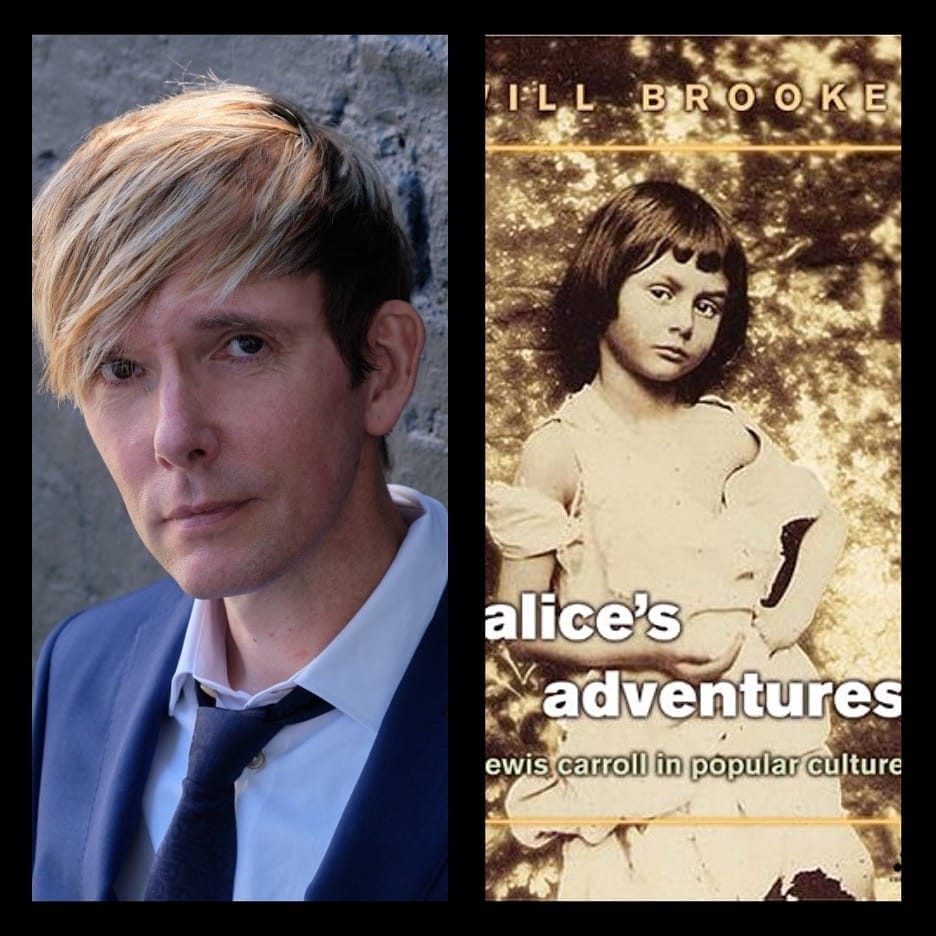
WR
He was really integral to our thinking about the film, because his book is Alice's Adventures: Lewis Carroll and Popular Culture. He went the Lewis Carroll route but, certainly, that inspired us when we were starting to think about popular culture. He speaks beautifully about the films and about the art that's been done since the publication of the book, and he certainly, as you've seen, is strongly opinionated about what he likes and what he doesn't like, in terms of the different illustrators. But he's not trapped by John Tenniel or the other early illustrators. He likes the scope. It was interesting, because, we have on one hand, someone like Ralph Steadman, but then we have Will Brooker who brings a scholarly side to it, and yet he's very approachable.
AM
He’s a university professor and he teaches film and culture, so he was perfect for our interview.
FB
He writes a lot about American McGee game, in the book, doesn’t he? Was there a connection?
WR
We didn't make a connection with between him and American McGee at all. We went back to England a second time and that's when we interviewed Will Brooker and, at that time, we had started to narrow our focus. That’s when we realized he was somebody we wanted to include and he is one of the great interviews, that ties a lot of the threads together. And he has the last word. But yes, certainly a big fan of American McGee, certainly a big fan of anything that's bringing Alice into current popular culture. But then he’s also very able to talk about the earlier artists too and the people who've been inspired by Tenniel or Furniss. He also spoke about the Jonathan Miller film and the Jan Svankmajer film. Those were high up on his list.

FB
Did you have a list of questions when you talked to each person? Or was it more free flowing and letting them share what came to mind?
AM
I'm gonna let Wendy answer that, but I'm gonna say that Wendy is an awesome interviewer. Because what she does is she starts up a conversation, so people can actually relax and converse rather than feel like they're on the spot.
WR
Often, we just did quick interviews with people that we'd run into at a conference, and I would have a list of a couple things that we wanted to touch on. But I think with somebody like Will Brooker or Ralph Steadman, or Brian Sibley, who's also a writer and scholar, I try and do my research. I hadn't read Will Brooker’s whole book, but I read the first and last chapters and a few things in between. So, I always have questions prepared. But usually what I do is I just have a conversation and then once I feel like we've run out of things to talk about, I go back to my list of questions and see if I've checked everything off. I always try and go in prepared, maybe have a quote or two from what they've written that I can talk about. But we didn't do any pre-interviews with anyone, it was very much just arrive and see where it takes us.
Part 2 of my interview with Andy Malcolm and Wendy Rowland will be published tomorrow, April 13th.
If you liked my interview with Andy and Wendy, please consider donating to their GoFundMe campaign to finish There’s Something About Alice so they can share it with the world.
Should you decide to support the documentary on GoFundMe, please send your receipt as proof of donation to automaticstudio@gmail.com to claim one of the following rewards:
For more information on Looking Glass Wars & Alice in Wonderland, check out the All Things Alice Blogs From Frank Beddor